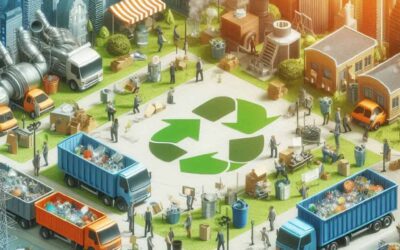The Second Recycling Revolution – Part 3
By Guest Authors Neil Seldman, The Recycling Cornucopia Project, Zero Waste USA and
Susan Kinsella, Conservatree and The Recycling Archives
In New York, the Beyond Plastics coalition has fought vigorously to stop an EPR bill that they say “will set recycling back for ten years” if it passes. The coalition has teamed with New York State Assembly members to produce an alternative bill. At the federal level, similar steps were taken to protect the bottle bill. Container legislation has been taken out of the federal EPR bill and an independent bill with requirements for phasing in mandatory refillable containers may move forward.
In Hawaii, an alternative EPR bill, with no PRO, passed both legislative chambers but stalled in the conference committee. Under this bill, fees go to a sequestered government fund, which distributes infrastructure investment money only after a Zero Waste plan is presented for funding. The bill stalled in the legislature’s Conference Committee after a withering wave of lobbying from global corporations led to the tabling of the bill.
The bill is unique as it focuses on taxing companies with $15 billion in gross sales, but not small and medium manufacturers.
In June 2022, global corporations undermined a citizens’ Zero Waste ballot initiative in California by expending a reported $30 million for lobbying to pass a monopoly-controlled EPR bill in the legislature that resulted in taking the citizens’ initiative off the ballot. This is yet another display of how industry dominates the legislative process.
A return to incineration is also part-and-parcel of the EPR debate, leading Zero Waste advocates to prohibit EPR materials from being incinerated, as they fear control by the plastics industry over decision-making. The plastics industry is pushing heavily for “chemical recycling” or “advanced recycling” as euphemisms for incineration as an antidote to the plastics crisis, disregarding the fact that burning plastics contributes to global climate change.
The incineration industry supports EPR legislation that takes decision making out of the hands of organized citizens and small businesses. Already the plastics industry is lobbying intensely for US EPA to reverse its policy that considers “advanced recycling” as incineration. Meanwhile, anticipating that reversal will succeed, the industry has built plants for small-scale pyrolysis gasification systems, touted as models for cities and counties. Hundreds of millions of dollars are waiting to build new virgin plastic manufacturing capacity, once the ‘solution’ to waste plastics is promised by this new wave of incineration.
Yet another threat of garbage incineration comes from the manufacture of what is essentially shredded garbage, minus the glass and metal. The fuel pellets produced are then burned in existing cement kilns and industrial boilers, thus avoiding the scrutiny of citizens who would otherwise be threatened by a new incinerator in their midst.
The emerging consensus among Zero Waste activists is that there is no need for a PRO, and certainly none for a PRO to control funding. Instead, they are advocating “Zero Waste criteria” for investments, and a national bottle bill with a mandated minimum percentage of products being in refillable bottles.
Penetration of recycling markets is a goal of major global corporate foundation efforts by the Closed Loop Fund and The Recycling Partnership. By buying up infrastructure for processing and manufacturing, they further restrict the market for municipal and county innovations. Beneficiaries of grants from these sources receive funds for more carts and more single stream recycling. Waste Management (WM) and Republic are purchasing end-use manufacturing capacity, as well, further threatening public decision-making and local control.
Decision-making by major industrial players leads to inefficiencies. Big Waste processing plants do not recover glass for industrial use, even though glass is infinitely recyclable and comprises 20-25% of the recycling stream. They claim there are no markets for glass. This is a lie that hurts the American glass industry, which currently recycles at the 35% level and would like to reach 90% or more because of energy and equipment savings. But the supply is artificially cut off. The single stream long distance/low value mixed materials model serves industry but comes with a costly system that is unfriendly to the public and the environment, denying cities of jobs and inhibiting the emergence of clean stream recycling needed for both domestic and international markets.
New services and technologies, as well as new business formats, can alter this trend. Road Runner is a recycling hauling company based in Pittsburgh, and rapidly expanding to metropolitan markets throughout the U.S., that uses a shared revenue strategy to get its small business clients to save money on discard management. Customers keep materials separated for careful collection and delivery to processors and end-use manufacturers.
The article originally appeared in the National Recycling Coalition Newsletter December 2022. https://nrcrecycles.org/




